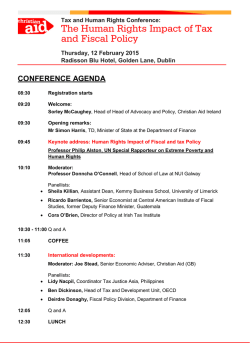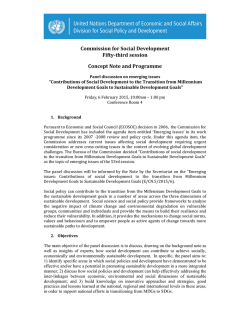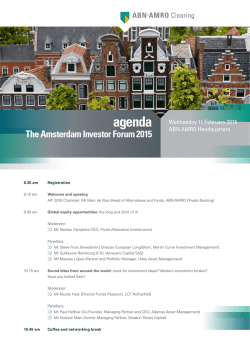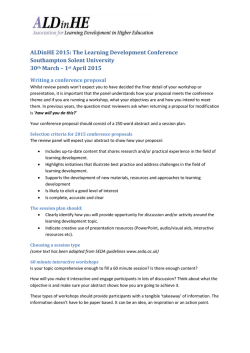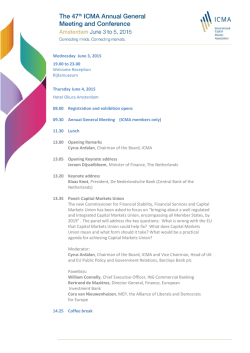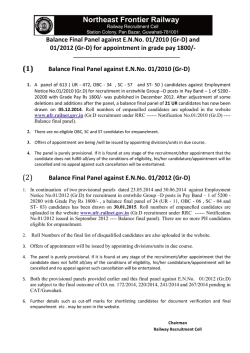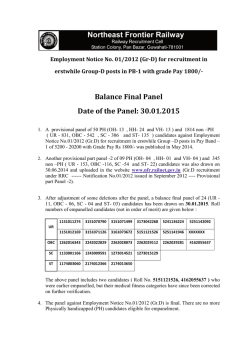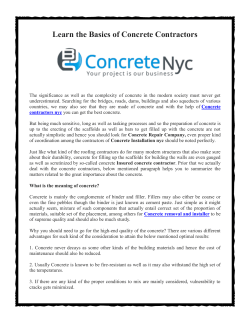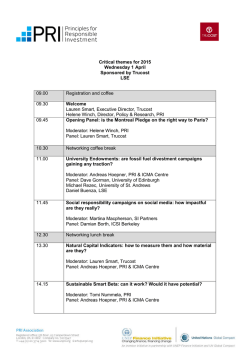
Concept Note
Commission for Social Development Fifty-third session 4 February 2015 High-level panel discussion on the priority theme “Rethinking and Strengthening Social Development in the Contemporary World” DRAFT CONCEPT NOTE I. BACKGROUND In its resolution E/RES/2014/3, the Economic and Social Council of the United Nations decided that the priority theme for the 2015-2016 review and policy cycle of the Commission for Social Development would be “Rethinking and strengthening social development in the contemporary world”. The resolution also reaffirmed that the Commission, in fulfilling its mandate, should assist the Council in monitoring, reviewing and appraising the progress achieved and problems encountered in the implementation of the Copenhagen Declaration on Social Development and Programme of Action of the World Summit for Social Development. The high-level panel discussion, which is scheduled to take place on Wednesday 4 February from 3:00 pm to 6:00 pm, is organized by the Commission in the context of this resolution. Reviewing progress made in and rethinking ways of strengthening social development in the current context is a timely endeavour. During 2015, Member States will adopt a new global development agenda to succeed the Millennium Development Goals. The year also marks the twentieth anniversary of the World Summit for Social Development. At the Summit, Governments agreed to give social development goals the highest priority, committing themselves to eradicating poverty, promoting full employment and fostering social integration based on the enhancement and protection of all human rights. In preparation for the fifty-third session of the Commission for Social Development, the Secretary-General submitted a report on the priority theme (E/CN.5/2015/3). The report shows that, twenty years after the Summit, its core commitments remain largely unfulfilled and acutely relevant. There has been progress in reducing poverty, but the international community remains far from eradicating it. Unemployment is as high today as it was in 1995 and many workers struggle to earn sufficient income in the informal sector, where social protection is largely absent. In every country, certain groups confront barriers that prevent them from participating in social, economic or political life. At the same time, recent economic, social, political and environmental trends present new challenges and, in some cases, provide new opportunities for social development. In reviewing progress in social development, the report aims to set the stage for the second report of the Secretary-General on the priority theme which, in 2016, will provide more concrete policy recommendations. II. OBJECTIVES The high-level panel discussion in the review year of the two-year cycle should provide an opportunity for members of the Commission for Social Development and other key stakeholders, including civil society organizations, to engage in a substantive dialogue on progress made towards the internationally-agreed social development goals –including poverty eradication, full employment and decent work for all, and social integration- as well as new trends and challenges to social development. In taking stock of what has worked (and what has not worked) to promote social development, the dialogue should inform national and international policy debates, including debates on the implementation and monitoring of the post-2015 global development agenda and the forthcoming sustainable development goals. The main objectives of the high-level panel discussion are, therefore, to (1) consider progress made towards social development, identifying the impact of major economic, social, political and environmental trends on such progress; (2) discuss concrete policies and strategies that have been effective in promoting social development; (3) identify concrete opportunities for the Commission for Social Development to help strengthen social development, including through the implementation and monitoring of the post2015 development agenda. III. STRUCTURE The panel will consist of six participants (five panellists and a moderator) representing Member States, academia and civil society organizations. Each panellist will be invited to make a 10-minute presentation. Following their presentations, the moderator will open the floor for questions and an interactive discussion. The panel discussion will be chaired by Ms. Simona-Mirela Miculescu, chair of the Commission’s Bureau. The panel discussion will be informed by the report of the Secretary-General on rethinking and strengthening social development in the contemporary world (E/CN.5/2015/3). Panellists are expected to structure their presentations around concrete social development issues, with emphasis on trends in poverty, inequality, employment and social integration. It is critical for panellists to bring data to: (a) assess progress in concrete social development indicators; (b) show where and under which conditions this progress has been most significant; and (c) discuss the links between concrete aspects of social development and recent economic, political and environmental trends. It is also important for panellists to discuss the policy implications of these trends –taking into account that a more comprehensive policy analysis will be undertaken by the Commission for Social Development at its fifty-fourth session, in 2016. Panellists should identify concrete opportunities for the Commission for Social Development to help strengthen social development, including through the implementation and monitoring of the post-2015 development agenda. Panellists are expected to share concrete examples and to highlight good practices and lessons learned in their presentations and interventions. Presentations should be engaging and thought-provoking. Panellists are strongly discouraged from reading prepared statements. The concrete format of and time allocation for the panel is as follows: Speaker Chair: Opening remarks Suggested speaking time 2 minutes Moderator: Context-setting 5 minutes Panellists (5): Presentations 10 minutes per panellist Moderated interactive discussion Interventions limited to 3 minutes or less followed by responses from panellists. There will be no formal statements. Total duration of the high-level panel discussion: 3 hours The panel discussion will take place at the United Nations Headquarters (Conference Room to be confirmed), in New York, on Wednesday, 4 February, 3:00 pm - 6:00 pm.
© Copyright 2026
